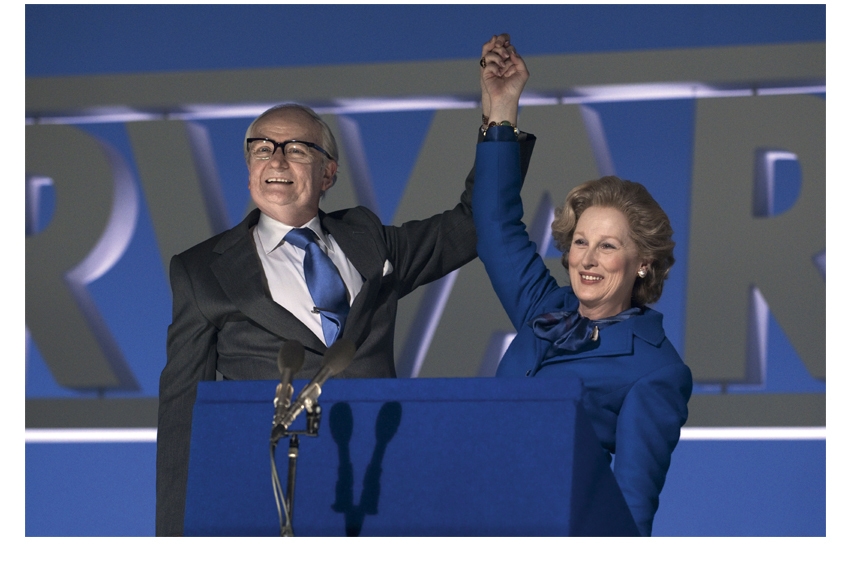The Iron Lady is a better performance than it is film, although I suspect the performance will carry the day. My good friend Meryl Streep, whom I have personally witnessed making pie with her very own Meryl hands, is awesome, flawless and magnificent, etc. but the film itself is peculiarly glib and superficial and somehow brushes over her actual politics. It is Thatcher without Thatcherism. It is Thatcher as a kind of Boadicea or Queen Elizabeth I. It is Gloriana of the kind that will please the Right and pleases Bruce Anderson (see feature pages) although, let’s be honest, anything that pleases Bruce Anderson does have to be a bit wrong somewhere. I hope Bruce will forgive me saying this, or what? Not sit on me, I hope. No one could be expected to survive that. (No, Bruce, no!)
Directed by Phyllida Lloyd from a script by Abi Morgan, it opens with a little old tottering head-scarfed lady entering a corner shop. She looks up when she reaches the counter, and we see it is Thatcher, or Meryl as Thatcher, although it amounts to the same thing, more or less, and you will gasp. Streep captures Thatcher’s mannerisms and voice and look without, somehow, ever descending into caricature. It never even feels like an impersonation. It’s miraculous. You have to see it to believe it. Anyway, Thatcher is confused. She is confused by the hoodie in the headphones behind her. She is confused when it comes to paying. She has dementia and has, it turns out, momentarily escaped Chester Square and her round-the-clock minders to buy a pint of milk. It is a poignant opening and one which asks for sympathy for her, if you’ve a mind to give it.
Thatcher is returned to Chester Square, where she talks to Denis (Jim Broadbent), imagining he is still alive — her dementia is handled with great sensitivity, I think — drinks rather a lot of whisky and gives Carol (touchingly played by Olivia Colman) short shrift. Carol urges her mother to sort through Denis’s clothes and as she does so unbidden memories float up and, in expository flashbacks, we are told her story, from weighing sweets in her father’s grocery shop right though to the present, but at such breakneck speed it entirely glosses over the politics. Events like the miners’ strikes and the poll-tax riots and the Falklands pass as brief, archival montages, while significant characters like Geoffrey Howe (Anthony Head) and Michael Heseltine (Richard E. Grant) are reduced to walk-on parts, more or less.
This is a film that has gone for breadth rather than depth unlike, say, The Queen, or Frost/Nixon or even The Damned United, which all focused on particular key historical moments, and evolved their own story arcs. This has no story, and although it’s essentially about grief and loss of power, we still don’t learn anything we didn’t know already. In the Morgan script stakes, I would say that Peter is still some way ahead of Abi.
Putting Meryl’s performance aside — I’ve raved about it enough, plus it was only a pie, and there was no custard — you do not get any sense of Thatcher’s political coming of age. Why did she believe what she believed, and why so vehemently? Why go to war, for example, over an island no one in Britain cared about? You also get no sense of the human cost of her policies, how she disadvantaged the poor and took a hammer to the society she did not believe in. At one point, angry protestors bang on her limo window and call her a ‘monster’ but that’s about it, and they can be dismissed as yobs.
Instead, Lloyd and Ms Morgan have chosen to tell the tale of a plucky female who breaks though the glass ceiling and rises to the top in a man’s world. There are many, many shots of her flanked by males; a blue hat in a sea of suits. (Where is Barbara Castle, by the way? Wasn’t she around?) It does underscore how she preferred male company and had little time for other women, including her own daughter — the scenes with Carol are the most persuasive, emotionally — yet as far as I can recall there is only one real insight into her personality. It’s when she visits a doctor and he queries how she is feeling and, in return, she queries, ‘Feelings?’
Like I said, the performance will carry the day here plus, perhaps, the jaunty tone and touches of humour. ‘Shall I be mother?’ Thatcher asks a confused US dignitary as she wields a teapot. But it gives her an easy ride and doesn’t get near the complexities of her character or the true impact of her policies. It is a film that pleases Bruce Anderson. It might be worth always bearing that in mind. (No, Bruce, no!)






Comments